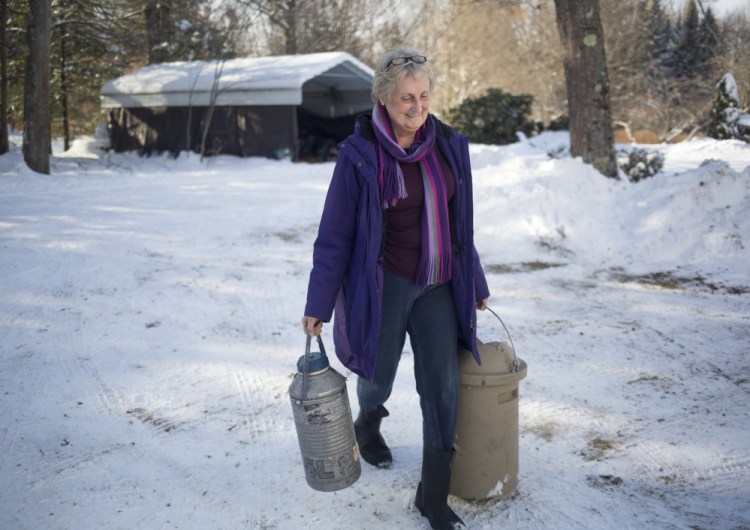When we first met Carolyn Woerter of Freeport it was a blazing hot August day and she had her truck loaded up with some mysterious-looking cannisters. Being nosy, we asked what they were and immediately asked for her number. Because how often do you meet a woman with a truck full of bull semen? We called Woerter up to find out more about how she got into the business of delivering bull semen to farms around Maine.
LEGACY: Woerter inherited the business, in a sense. This was her husband’s work for 35-plus years, and she watched him get up every morning excited to go to work, which entailed driving around Maine visiting farms (mostly dairy then) to deliver “product,” aka the semen. Frankly, she felt a little jealous as she headed off to her retail job in furniture. He worked for ABS, the Wisconsin-based worldwide leader in bovine reproduction services and technologies. “That anyone could get up and enjoy their work that much,” Woerter says, “I thought, how lucky is that?”
She also feared that the business he’d worked so hard to build up would disappear without him. So after his death at 73, she picked up his client list and stepped into a new career.
STATE OF AFFAIRS: Back in the day, when Maine’s dairy business was thriving, Woerter’s husband served a section of Maine, dividing up the workload with other ABS representatives. Today, Woerter has almost all of it to herself, with just a small southern slice of the state tended to by an ABS representative in New Hampshire. “I’ve got a couple of herds in the Cornish area, so I go from there up into Farmington, over to Dover-Foxcroft and down to the coast.”
Unlike her husband, Woerter does not provide the insemination service itself; that’s left to farmhands or the farmers themselves these days.
SALES PITCH: New “proofs” come out three times a year, and Woerter tends to deliver those catalogs, which outline the bull’s production and genetic traits as a sire, in person. “I will be on the road most of the end of this month making sure they have that information,” she says. Her style is not to be particularly pushy with the product. “It’s about cow families, and basically what a particular farm is looking for to improve their own herds,” she says. “Basically the farmers know their cattle really well and we don’t want to go in and say ‘We think you should use this bull or whatever.’ ”
Her respect for farmers and the thin margins they live within is deep. “They work very hard for what they make. They have to be very wise about how they go about it, how they spend their money, what is most profitable. Obviously, like any wise shopper, they are always shopping.”
BUSY TIMES? Woerter is on the road regularly, but maybe a bit more in some seasons. “August is a busy time,” she says. “In the heat of the summer, the cattle tend not to settle as well.” Settle, meaning get pregnant, or to use a term made famous by William Faulkner, “light in August.” That’s when Woerter might have to head back to the farm with another batch of product.
SPECIAL DELIVERY: Speaking of, how does she get it? “UPS!” It arrives in a dry vapor tank. She places orders every week or every other week. “It comes in and I deliver it. I can give them a pretty good idea when to expect it (this so that delivery can be timed with a cow going into heat), unless it is back ordering.” Say what? “If it is one of these bulls that doesn’t produce as much as it should,” she explains. Aha. So there is such a thing as a bull that’s too popular for its own good.
FIELD NOTES: Woerter has observed a shift in recent years as Maine’s dairy industry contracts and more farmers get into raising beef herds. She hates to see a farm go. “It is discouraging to see all these farms that have gone by the wayside with no one to take over and they have to sell their property.” Because, as she puts it, “They don’t make land. Once it is gone, it is done.”
In Freeport, where she lives, she sees the steady march of development. That’s why she’s so determined to hold onto her land, which is about 100 acres of active woodlot. She doesn’t do any harvesting herself, does she? “If I could I would,” she laughs. “I have the forester come in.” She’ll keep at that. “As long as I can. But around me, I am being squeezed to exactly the land I own.”
JOY IN THE MORNING? Does she feel, as her husband did, excited to go to work? “Yes I do.” She’s 73 now herself, so one wonders if she’s thinking about retiring. “I felt at one point, maybe it is time. Then I thought about it, and I couldn’t go through with it.” Because the more she thought about it, the more she realized she’d miss hitting the road. “I’d miss the people,” she says.
Send questions/comments to the editors.





Success. Please wait for the page to reload. If the page does not reload within 5 seconds, please refresh the page.
Enter your email and password to access comments.
Hi, to comment on stories you must . This profile is in addition to your subscription and website login.
Already have a commenting profile? .
Invalid username/password.
Please check your email to confirm and complete your registration.
Only subscribers are eligible to post comments. Please subscribe or login first for digital access. Here’s why.
Use the form below to reset your password. When you've submitted your account email, we will send an email with a reset code.